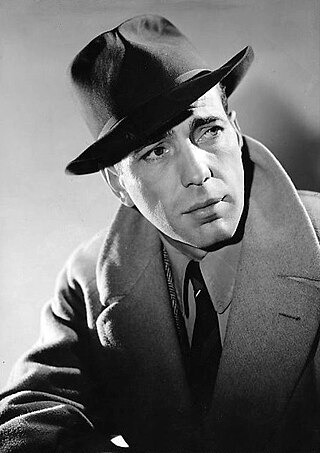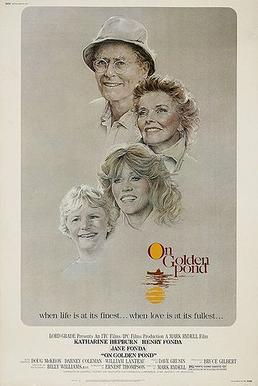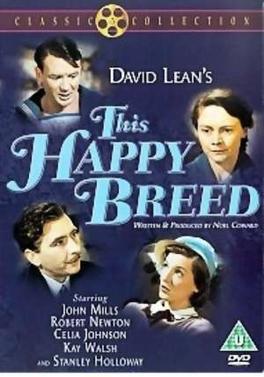
Humphrey DeForest Bogart, nicknamed Bogie, was an American actor. His performances in classic Hollywood cinema made him an American cultural icon. In 1999, the American Film Institute selected Bogart as the greatest male star of classic American cinema.

Thomas Erskine, 1st Baron Erskine, was a British Whig lawyer and politician. He served as Lord High Chancellor of Great Britain between 1806 and 1807 in the Ministry of All the Talents.

Key Largo is a 1948 American film noir crime drama directed by John Huston and starring Humphrey Bogart, Edward G. Robinson and Lauren Bacall. The supporting cast features Lionel Barrymore and Claire Trevor. The film was adapted by Richard Brooks and Huston from Maxwell Anderson's 1939 play of the same name. Key Largo was the fourth and final film pairing of actors Bogart and Bacall, after To Have and Have Not (1944), The Big Sleep (1946), and Dark Passage (1947). Claire Trevor won the 1948 Best Supporting Actress Academy Award for her portrayal of alcoholic former nightclub singer Gaye Dawn.
Johnny Belinda is a 1967 television film directed by Paul Bogart. It is based upon the play Johnny Belinda by Elmer Blaney Harris. The film was thought to be missing from UK TV archives, but was discovered being sold in the United States on DVD by Kaleidoscope's Ray Langstone and a copy now resides with Kaleidoscope.

Sir William Henry Weldon was a long-serving officer of arms at the College of Arms in London. Weldon is most unusual among the heralds of the College of Arms for having once been the owner of a circus. He was involved in a long-standing and very public civil suit with his wife.

Kid Galahad is a 1937 American sports drama film directed by Michael Curtiz and starring Edward G. Robinson, Bette Davis, Humphrey Bogart and, in the title role, rising newcomer Wayne Morris. A boxing film, it was scripted by Seton I. Miller and distributed by Warner Brothers. It was remade in 1941, this time in a circus setting, as The Wagons Roll at Night, also with Bogart, and in 1962 as an Elvis Presley musical. The original version was re-titled The Battling Bellhop for television distribution in order to avoid confusion with the Presley remake.
"Joke Over" is the thirteenth episode of the fifth and final series of the period drama Upstairs, Downstairs. It first aired on 30 November 1975 on ITV.

Zoo in Budapest is a 1933 American Pre-Code romance/melodrama film directed by Rowland V. Lee and starring Loretta Young, Gene Raymond, O.P. Heggie, and Paul Fix. Gene Raymond, playing Zani, a young, mischievous man who has grown up only around the animals and the people that work and visit the zoo. Loretta Young plays Eve, who is an orphan who only wants to escape her situation and be out in the real world. O.P. Heggie plays Dr. Grunbaum, a father-like figure to Zani, as well as the zoo's doctor. The original 35mm prints of the film contained sequences tinted in amber or blue.

On Golden Pond is a 1981 drama film directed by Mark Rydell from a screenplay written by Ernest Thompson, adapted from his 1979 play of the same name. It stars Katharine Hepburn, Henry Fonda, Jane Fonda, Doug McKeon, Dabney Coleman and William Lanteau. In the film, Norman, a crusty, retired professor grappling with many effects of aging, has been married for many years to upbeat, feisty Ethel, and has had a remote, difficult relationship with their daughter, Chelsea. At their summer home on Golden Pond, Norman and Ethel agree to care for Billy, the son of Chelsea's new boyfriend, and an unexpected relationship blooms.

This Happy Breed is a 1944 British Technicolor drama film directed by David Lean and starring Robert Newton, Celia Johnson, Stanley Holloway and John Mills. The screenplay by Lean, Anthony Havelock-Allan and Ronald Neame is based on the 1939 play This Happy Breed, by Noël Coward. It tells the story of an inter-war suburban London family, set against the backdrop of what were then recent news events, moving from the postwar era of the 1920s to the inevitability of another war, and the passing of the torch from one generation to the next. Domestic triumphs and tragedies play against such transformative changes as the coming of household radio and talking pictures. The film was not released in the United States until April 1947.

Oliver Peters Heggie, billed as O. P. Heggie, was an Australian film and theatre actor best known for portraying the hermit who befriends the Monster in the film Bride of Frankenstein (1935). He was born Otto Peters Heggie at Angaston, South Australia to a local pastoralist. He was educated at Whinham College and the Adelaide Conservatoire of Music. He died in Los Angeles of pneumonia. He is buried at Woodside Cemetery, Yarmouth Port, Barnstable County, Massachusetts.
"Simple Explanation" is the 20th episode of the fifth season of House. It first aired on Fox on April 6, 2009.

Georgina Weldon was a British litigant and amateur soprano of the Victorian era.

Anna Lucasta is a 1958 American drama film directed by Arnold Laven and written by Philip Yordan. It stars Eartha Kitt, Sammy Davis Jr., and Henry Scott. It is a remake of the 1949 film noir version, which itself was an adaptation of the 1936 stage play.
"Dead & Buried" is the seventh episode of the eighth season of the American television medical drama series House and the 162nd overall episode of the series. It aired on Fox in the United States on November 21, 2011.
"Perils of Paranoia" is the eighth episode of the eighth season of the American television medical drama series House and the 163rd overall episode of the series. It aired on Fox on November 28, 2011.
Dobol Trobol: Lets Get Redi 2 Rambol! is a 2008 Filipino comedy film starring Dolphy and Vic Sotto. The film was a box office success, grossing ₱90.5 million.

Another Language is a 1933 American Pre-Code romantic drama film directed by Edward H. Griffith and starring Robert Montgomery and Helen Hayes.

The Wycherly Woman is a detective novel by Ross Macdonald. The ninth to feature Lew Archer, it was published by Alfred A. Knopf in 1961. Earlier that year a condensed version had appeared in Cosmopolitan under the title "Take My Daughter Home". The novel was nominated for the 1962 Edgar Awards, and earlier included in Anthony Boucher’s best crime fiction list of 1961.
Anselma, also known as The Princess Andrea, is a play in six acts. It is an 1885 English-language adaptation of Victorien Sardou's 1873 French-language play Andréa which was created by Leander Richardson for the Austrian actress Antonie Janisch (1848-1920), known on the stage as Madame Janisch. The play became a source of contention in the Judiciary of New York with several legal battles between the producers of Anselma and the actress Agnes Ethel arguing over the rights to Sardou's play.













